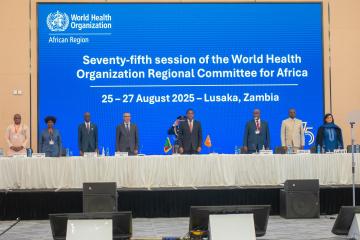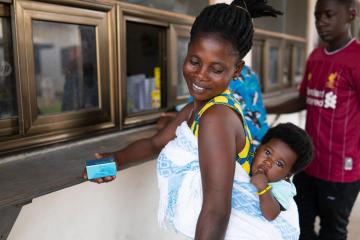Medicine Pricing and Financing
Medicine Pricing: The program provides information on procurement prices of essential medicines collected from public procurement agencies and international suppliers of generic medicines. A more user-friendly system to capture tender prices from public procurement agencies is under development.
Essential medicines in public health facilities are not regularly available and people are obliged to pay higher prices for their medicines out of pocket from the private sector. Medicine prices vary within and across countries and are unaffordable especially in the private sector. The need for policy guidelines and options for countries to improve affordability and availability of essential medicines remains one of the priority areas.
Financing of medicines: Public sector per capita expenditure for medicines in many countries of the Region remains below US$ 2 and is far from adequate. In view of improving the availability and affordability of essential medicines, strengthening and exploring alternative medicines financing mechanism has been given paramount importance. The program works with the World Health Organization/Pan American Health Organization Collaborating Center in Pharmaceutical Policy (http://www.whoccpp.org/) to develop appropriate tools; carry out household surveys and analysis of data on access and use of medicines.
The development and implementation of appropriate policies and strategies including regulating medicine prices and expanding coverage of essential medicines under health insurance schemes are given due emphasis. Countries are being encouraged and supported to use Health Technology Assessments to determine priority services and products.
Medicines Regulation and Quality Assurance Systems
The focus in Medicines Regulation and Quality Assurance Systems is on establishing and strengthening national medicine regulatory authorities to develop enabling legal frameworks, regulatory systems reforms, norms, and standards to ensure the quality, safety, and efficacy of all medical products and to put in place necessary infrastructures and procedures for quality assurance mechanisms. Aside the development of a regional framework to strengthen national medicine regulatory authorities, the WHO regulatory benchmarking programme has remarkably been a game-changer. The goal of the programme is to help countries ensure that their regulatory systems are effective, efficient, and transparent. A lot of countries in the region has shown encouraging interest in WHO benchmarking process and through it, support is provided to medicine regulatory authorities to build their capacity, enforce national laws and regulations. Currently, five member states in the WHO Africa Region have regulatory systems with processes adjudged by WHO to be stable, well-functioning and integrated. (Ghana, Nigeria, Tanzania, South Africa, and Zimbabwe), with at least two other countries on the cusp of joining this desirable placement. The fight against circulation of substandard and falsified products is one of the priority areas. The Program advocates for effective enforcement of policies and regulations and promotes regional cooperation to combat the circulation and use of substandard and/or counterfeit medicines in partnership with relevant stakeholders in pharmaceuticals. Increased attention is currently being paid to the recurrent issue of contamination of pediatric preparations with Diethylene Glycol and Ethylene Glycol. WHO is collaborating with partners to develop a dashboard to serve as a guide for the selection of effective portable devices to use in screening these important medical products to ensure the safety and quality of essential medicines especially in low and medium countries.
Apart from specific country support activities, WHO is joint secretariat to the African Medicines Regulatory Harmonisation Initiative (AMRH) together with AUDA-NEPAD. The AMRH was established in 2009 to harmonize fragmented regulatory requirements on the continent and WHO has been providing both technical and financial support to the regional and continental harmonization initiatives’ through forums and technical committees. These activities for instance, joint assessments have resulted in shorter timelines for the approval of quality-assured life-saving medicines thereby improving access. The AMRH serves as a foundation for the African Medicines Agency and WHO is supporting AMA in establishing a robust foundation to become a trusted reference Agency.
In order to enhance generation of scientific evidence on safety, efficacy, and quality of traditional medicines guidelines for clinical studies on Traditional Medicines including protocols has been developed. Furthermore, capacity development and valuation of research results in pre-clinical and clinical evaluation of Traditional Medicines have been carried out. The WHO Regional collaborating centers for quality assurance of essential medicines in South Africa and Algeria provide technical support to countries as necessary.
National Medicine Policies
The focus in National Medicine Policy is on supporting countries to engage in policy dialogue, policy development and analysis, preparation of implementation plans and ensuring the commitment of all stakeholders to national policies on medicines and traditional medicine policies and blood and blood products. Forty-five countries in the region have comprehensive national medicine policies.
The Program collaborates with partners and stakeholders to strengthen human resource capacities; enhance implementation of national medicine policies and promote transparency and good governance in the pharmaceutical sector. Furthermore, providing support to countries to implement the global strategy and plan of action for public health, innovation and intellectual property. Information for the Pharmaceutical Sector is regularly collected and status of implementation of national medicine policies is monitored.
Procurement and Supply Systems
The focus in Procurement and Supply Systems is on regular availability of affordable and quality essential medicines plays key role in the delivery of health care services. The program supports public procurement and supply agencies tostrengthen their capacity and improve efficiency in the procurement and supply management of essential medicines.
The program collaborates with other WHO programs in assisting countries to develop national medicine procurement plans.
The program focuses to identify and document best practices in procurement and supply management to strengthen capacities for effective public procurement and supply systems. Pooled Procurement is being promoted and advocacy for pooled procurement is has been intensified for the Regional Economic Communities to participate in such mechanisms to improve access to good quality health products that are affordable. WHO is supporting Small Island Developing States (SIDS) and Regional Economic Communities such as ECOWAS and CEMAC to establish pooled procurement mechanisms to improve access and affordability of health products.
Local Production
Local production capacities in the region for essential medicines have been assessed and a regional framework was developed to strengthen local production of essential medicines. Through the WHO prequalification program, local manufacturers are being supported to achieve compliance with international standards for production of eligible, priority medical products including medicines, vaccines, medical devices and in-vitro diagnostics. Local production assistance, include conducting ecosystem assessments, supporting policy dialogue, strategic planning and guidance, and capacity building.
Rational Use of Essential Medicines
The focus in Rational use is on supporting countries to implement cost effective interventions aiming at improving the rational use of medicines and traditional medicines by health professionals and consumers.
With support from WHO, to-date, all (47) the countries in the region have developed essential medicines lists linked to standard treatment guidelines for the most common diseases, and some countries have developed national medicine formularies. In many countries, national list of essential medicine are used to guide selection of medicines for procurement, good prescribing and dispensing practices mainly in the public sector.
Support is provided to countries to revise these tools regularly in order to meet changing public health needs. The program has developed guidelines for training of Health Science Students in Traditional Medicine and Traditional Health Practitioners in Primary Health Care. Implementation of appropriate policies and strategies to improve the rational use of essential medicines continues to educate the public and to provide needs-based and patient centred pharmaceutical care in public health facilities in collaboration with, partners, professional associations, academia, consumer organizations and other stakeholders.







